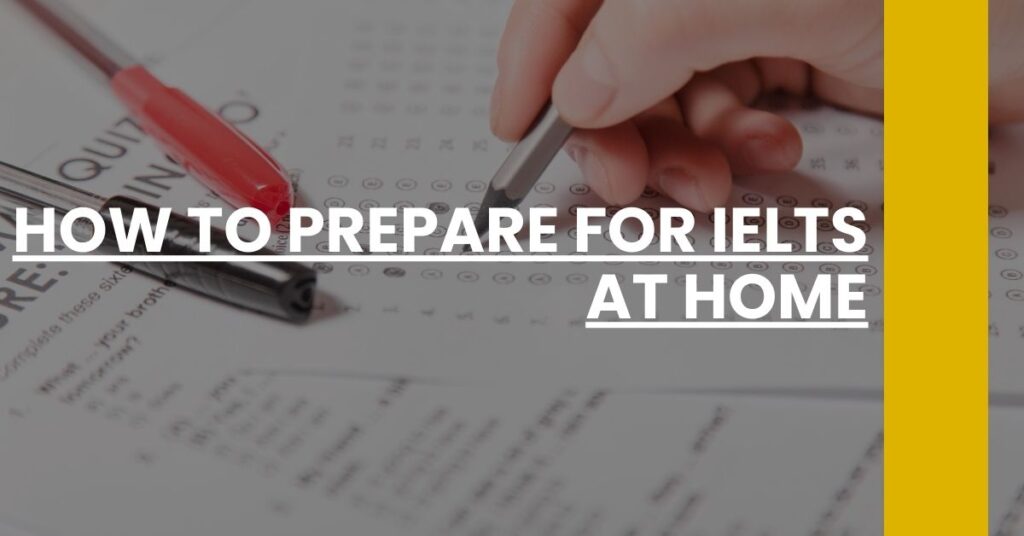Learn how to prepare for IELTS at home effectively with our focused tips.
- Home-based IELTS Strategies: Tailor your study environment to mirror IELTS exam conditions.
- IELTS Study Materials: Curate the most impactful resources for comprehensive at-home preparation.
- IELTS Practice Techniques: Employ consistent practice sessions to sharpen your testing skills.
Achieve IELTS success with structured home preparation.
- Understanding the IELTS Test Format
- Identifying Your Strengths and Weaknesses
- Setting Realistic Goals and Crafting a Study Schedule
- Gathering the Right Study Materials
- Developing Your English Skills Holistically
- Practicing with Mock Tests
- Focusing on Time Management
- Enhancing Your Test-Taking Strategies
- Seeking Feedback and Support
- Staying Positive and Consistent
- Leveraging Online Tools for English Improvement
- Exploring Section-Wise IELTS Tips
- Utilizing IELTS Sample Papers and Preparation Guides
- Extra Tips for Achieving the Best Possible IELTS Score
- Conclusion
Understanding the IELTS Test Format
Preparing for the IELTS at home begins with a solid understanding of the test’s structure. IELTS, or the International English Language Testing System, is designed to assess the language ability of candidates who need to study or work where English is the language of communication.
What Are the Four IELTS Sections?
The IELTS is comprised of four core components:
- Listening: This 40-question section takes about 30 minutes, with various types of recordings and questions.
- Reading: You will tackle 40 questions in 60 minutes, based on diverse reading passages.
- Writing: Includes two tasks, one of 150 words and another of 250 words, to be completed in 60 minutes total.
- Speaking: A 11 to 14-minute one-on-one interview with an examiner, including a short speech from you.
Each part requires specific skills and strategies, which you can develop during your IELTS home preparation journey. Delve into the official IELTS test format to get acquainted with each section’s nuances.
Identifying Your Strengths and Weaknesses
To effectively prepare for IELTS at home, it’s crucial to analyze your current language capabilities. You must distinguish the areas where you excel from those where you need improvement.
How Can You Self-Assess Your Language Skills?
- Listening: Test yourself with various English accents and listen to different types of audio materials.
- Reading: Try reading articles on different subjects to see how well you comprehend them.
- Writing: Record how effectively you can express ideas in writing within a given time frame.
- Speaking: Practice speaking on various topics, noting your fluency and accuracy.
Evaluating your performance in these areas will help you design a personalized study plan.
Setting Realistic Goals and Crafting a Study Schedule
Success in your IELTS home preparation relies on setting achievable objectives and a structured schedule.
Creating a Study Plan That Works for You
First key idea: Consider your daily routine and allocate specific times for focused IELTS study. Second key idea: Balance is essential; avoid over-scheduling to prevent burnout. Third key idea: Set short-term milestones leading up to your overall target score.
Your plan should include revision time, practice tests, and regular breaks to maintain efficiency. For more tips on creating a study schedule, visit Magoosh’s IELTS study plan guide.
Gathering the Right Study Materials
Choosing the right study resources is a cornerstone of how to prepare for IELTS at home.
Essential IELTS Materials You Need
- Official Practice Books: Options like Barron’s IELTS provide comprehensive practice exercises.
- Free Online Resources: Websites such as IELTS Simon or IELTS buddy offer templates and tests.
Diverse materials will ensure you’re well-prepared across all areas of the test. You can find a variety of resources, from books like IELTS 15 for the most recent practice tests to free practice available online.
Developing Your English Skills Holistically
It’s important to engage with the English language in a well-rounded manner.
How to Enhance Your Skills Across All Areas
- Expand Your Vocabulary: Learn new words daily and incorporate them into conversations.
- Practice Grammar: Use workbooks to improve your grammar understanding and correctness.
- Read Regularly: Explore different genres to become familiar with a range of writing styles.
- Engage in Listening: Listen to English podcasts, songs, and watch movies without subtitles.
Regularly practicing each skill is vital, as laid out by Cambridge English’s recommendations.
Practicing with Mock Tests
Nothing can replicate the conditions of the actual test day better than mock exams.
The Importance of Mock IELTS Tests
- Replicate Test Conditions: Sit in a quiet room with a timer to mimic the pressure you’ll face.
- Test Your Strategies: Apply the techniques you’ve studied in a realistic setting.
- Identify Weaknesses: Use the results to find out what areas you still need to work on.
For authentic test practice, it’s essential to use official materials where possible. Work through a variety of IELTS mock tests to cover all test formats.
Focusing on Time Management
Mastering the content is only part of the equation; you must also learn to manage your time effectively during the IELTS exam.
Time Management Strategies for Each Section
Listening:
- Get used to the pacing of the audio tracks. Practice with an array of listening exercises to reduce the time it takes for you to comprehend and answer.
Reading:
- Train yourself in skimming and scanning techniques. Tackle various types of questions quickly by practicing with diverse reading examples.
Writing:
- Allocate a set amount of time for each writing task. Spend more time on Task 2 as it carries more weight in the scoring.
Speaking:
- Practice formulating and expressing ideas promptly. Speak concisely but naturally, ensuring you answer questions within the allotted time span.
Excellent time management is not just about speed but about giving each task its due diligence within the constraints of the test.
Enhancing Your Test-Taking Strategies
As you discover how to prepare for IELTS at home, refining your test-taking strategies is essential. This means going beyond merely understanding the material and focusing on how to approach the IELTS questions in the most efficient and effective way possible.
Understanding Question Types
Each IELTS section has different question formats that you’ll need to familiarize yourself with:
- Listening: Prepare for various formats such as multiple-choice and form completion.
- Reading: Tackle headings, match-ups, and sentence completions to hone in on your scanning skills.
- Writing: Practice different types of essays and reports, focusing on structure and coherency.
- Speaking: Anticipate common questions and focus on your fluency and pronunciation.
Tactics for Effective Answering
Implement test strategies that can increase your accuracy and speed:
- Prioritizing Questions: Begin with the questions you find easiest to build confidence.
- Eliminating Wrong Answers: Narrow down multiple-choice options to increase your chances of correct answers.
- Time-Check Intervals: Regularly glance at the clock to ensure you’re on pace, not spending too much time on one section.
By integrating these mastering strategies seamlessly into your study routine, you’re likely to see improvements in both your speed and accuracy.
Seeking Feedback and Support
Your preparation for IELTS at home should not feel like a solitary confinement. Seeking feedback from others can offer new insights and identify errors that you may not see on your own.
Ways to Obtain Constructive Criticism
- Engage with a Tutor: If possible, hire an IELTS tutor for personalized guidance.
- Online Forums: Join online communities where experienced IELTS takers can provide feedback.
- Study Groups: Collaborate with peers also preparing for IELTS to exchange tips and critiques.
Regular feedback can transform your approach, highlighting areas for improvement that you may have overlooked. Combine this with your diligent self-study for an all-rounded preparation process.
Staying Positive and Consistent
A vital aspect of your IELTS journey is maintaining a positive outlook. The preparation process can sometimes be challenging, but a positive and resilient mindset will keep you motivated.
Cultivating the Right Attitude
- Acknowledge Your Progress: Celebrate small victories to keep spirits high.
- Visualize Success: Imagine yourself achieving your desired IELTS score.
- Resilience: Treat setbacks as learning opportunities, not failures.
This positive mental framework is not just fluffy advice—it’s a cornerstone of your home-based IELTS preparation strategy.
Leveraging Online Tools for English Improvement
The internet is a treasure trove of resources when you’re figuring out how to prepare for IELTS at home. Online tools provide innovative ways to engage with English, from interactive exercises to educational videos.
Noteworthy Online Resources
- Language Learning Apps: Use applications like Duolingo for daily vocabulary practice.
- IELTS Blogs: Read blogs with tips and experiences from other IELTS learners.
- Educational Platforms: High-quality platforms like Magoosh’s IELTS prep can guide your study plan with structured tutorials and practice questions.
The careful curation of these online tools can complement your study materials, providing a diverse, accessible way to improve your English language skills.
Exploring Section-Wise IELTS Tips
Tackling the IELTS with section-wise tips can enhance your performance. Each section requires a slightly different approach and mastering these can make all the difference.
Practical Tips for Each IELTS Section
- Listening: Focus on identifying keywords and practice with a variety of accents.
- Reading: Develop the habit of reading quickly and summarizing paragraphs.
- Writing: Work on structuring your essays and integrating complex sentences.
- Speaking: Practice speaking out loud, recording yourself, and reviewing your performance.
These tips from those who have excelled at IELTS, like Thierry Maout’s reflection on scoring an 8.5, can provide you with clear insights into what to expect and how to prepare.
Utilizing IELTS Sample Papers and Preparation Guides
IELTS sample papers and preparation guides are invaluable as you learn how to prepare for IELTS at home. They replicate exam conditions and help you familiarize yourself with the types of questions you will encounter.
How Sample Papers Can Help
- Exam Format Awareness: Understand the exact format of each section.
- Time Management: Practice completing each section within the time limit to improve speed.
- Self-Assessment: Evaluate your performance to identify where you need to focus more.
Through consistent practice using these materials, you’ll gain confidence and a sense of what to expect on test day.
Extra Tips for Achieving the Best Possible IELTS Score
Every IELTS candidate has unique strengths and weaknesses, but there are additional tips that can universally benefit your preparation process.
Unconventional Yet Effective Tips
- Mindfulness and Relaxation: Reduce stress through activities like meditation or light exercise.
- Diet: Eating brain-boosting foods can help you focus better during your study sessions.
- Mock Exam Day: Run through a full test day, complete with pauses and an exact schedule, to simulate the IELTS exam environment.
Incorporate these into your routine to optimize your preparation strategy for the best possible outcome.
Conclusion
IELTS preparation at home can be a fruitful and productive endeavor with the right strategies in place. By focusing on familiarizing yourself with the test format, seeking feedback, and using a mix of materials and resources, you can put yourself in a strong position to succeed. As you sharpen your skills and build confidence, remember that consistency and a positive outlook can significantly contribute to achieving your IELTS goals. With these elements in harmony, you are well on your way to demonstrating your English proficiency in one of the world’s most recognized language assessments.
Learn how to prepare for IELTS at home with simple, effective strategies to bolster your English skills for the exam.

